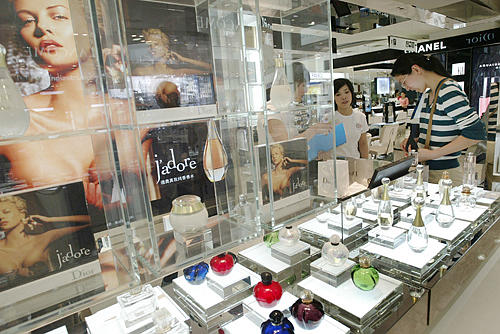|
 |
|
ATTRACTIVE SCENTS: Luxury brand perfumes draw women's attention in a big shopping mall in Nanjing, capital city of east China's Jiangsu Province (CFP) |
China's domestic consumer spending on luxury goods reached $12 billion last year, ranking second in the world, next only to Japan. China is expected to become the world's largest market for luxury goods by next year. Due to high import duties on luxury goods, Chinese consumers usually go to Hong Kong or abroad to buy large quantities of luxury items.
At present, the heavy tax imposed on imported luxury goods comprises import duty (from 6.5 percent to 18 percent), value-added tax (17 percent) and consumption tax (30 percent), accounting for 60 percent of the final price. Recent statistics released by the Ministry of Commerce (MOFCOM) show the prices of imported luxury items on China's mainland are 45 percent higher than in Hong Kong, 51 percent higher than in the United States, and 72 percent higher than in France.
A MOFCOM spokesman said the government is seriously considering cutting import duties on luxury goods such as cosmetics, handbags and alcohol. This has brought about a heated debate on whether or not to cut import duties on luxury goods.
Supporters of a reduction in duty say an adjustment would keep huge purchasing power in the domestic market, drive economic growth, and balance the trade surplus.
On the other hand, opponents say cutting taxes would impact domestic industries and widen the gap between the rich and the poor, causing widespread discontent among the public.
Supporters
Yao Jian (http://www.mofcom.gov.cn): Transferring consumption power on medium- and high-level products from abroad to the Chinese mainland can play an obvious and important role in propelling domestic consumption and enhancing the quality of domestic products.
This year marks the 10th anniversary of China's entry to the WTO and also China's GDP per capita has reached more than $4,000. It should be a trend for China to lower the duties imposed on imported products to further promote convenience in trade between China and foreign countries.
Cheaper imported products will stimulate domestic companies to enhance the quality of their products and meet consumers' needs for high-quality products. For example, there have been several scandals related to milk powder produced in China, yet many people have a large need for this product. If more foreign brands of milk powder can enter the Chinese market with less taxation, it will allay consumers' worries and promote quality improvement in domestic brands.
The key to lowering import taxation lies in changing our concepts. We used to only emphasize exports as an achievement, but importing is also an achievement. China's greater consumption power will give it more impact on international trade.
Zuo Xiaolei (http://finance.sina.com.cn): Cutting tariffs on imported luxury goods would bring many benefits.
First, it will increase imports. Reducing taxes would attract Chinese consumers back to the domestic market, and reduce the unnecessary trade surplus.
Second, this will also provide greater convenience to Chinese consumers. Cutting tariffs would lower the price of luxuries and promote business growth on the Chinese market so consumers would not need to buy luxury goods by way of traveling abroad as tourists, or from an agency. Moreover, luxury goods buyers would enjoy the world's newest fashions and receive better after-sales service at home.
Third, increased domestic consumption with lower tariffs on imported luxury goods is helpful to promote industrial structure adjustment and change the mode of economic growth.
Lastly, the reduction of tariff revenue on luxuries would be made up by an increase in the business tax. As a result, the Central Government's gross fiscal revenues would not be affected.
| 